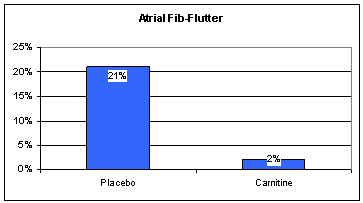

Return to Bioenergetic Support Page
Carnitine in Cardiomyopathy and CHF
Carnitine is critical to energy metabolism. The heart under strain is low in Carnitine, so it stands to reason that Carnitine supplementation would be of value in CHF and Cardiomyopathy. Let's take a look at a few of the studies:
70 patients with advanced cardiomyopathy, all under treatment with diuretics, digoxin, and an ACEI (angiotensin converting enzyme inhibitor), were randomized to receive Carnitine 2,000 mg/day or placebo. All other therapies were continued. None of the 70 patients had coronary disease or atrial fibrillation; none were receiving anti-arrhythmic medication.


The onset of atrial fibrillation, a rapid, irregular rhythm emanating from the atrial, decreases cardiac output considerably and places the patient at risk for clot formation and embolism. Atrial fibrillation or flutter occurred in 21% (7/33) of the cardiomyopathy patients receiving placebo and in 2% (1/37) of those treated with carnitine. Six of the placebo treated patients died, 5 from CHF and one suddenly. Only one of the carnitine treated patients died.
In another study, patients with NYHA Functional Class II-IV CHF were treated over eight weeks either with placebo or carnitine 900 mg/day. Placebo therapy had no effect. Amongst the carnitine treated patients, 55% improved by at least one Functional Class, ejection fraction rose in 44%, shortness of breath with effort was relieved in 44%, and edema resolved in 1/3rd - overall 2/3rds improved.
500 mg/day of Propionil-Carnitine was administered to patients with mild-moderate CHF. The average ejection fraction rose by 8%, from 41 to 45% at thirty days, and to 47% at ninety days. Treadmill time increased by 16% at 30 days, and by 26% at six months, from 7.6 to 9.6 minutes.
If you have cardiomyopathy, I will attempt to reverse it with MME and a detoxification strategy, because toxicity is usually the underlying cause of this condition. Until the cardiomyopathy has resolved/improved, I will treat you with standard drug therapy, and if you do not improve, or do not wish to be considered for MME, I will refer you for biventricular pacemaker placement. I will also treat you with carnitine, Co-Q10, and related bioenergetic agents, and I will also offer you EECP for additional support. In other words, I will offer you the standard of care, which really isn't much, along with detoxification, MME, and EECP - much more.
James C. Roberts MD FACC
1/01/07